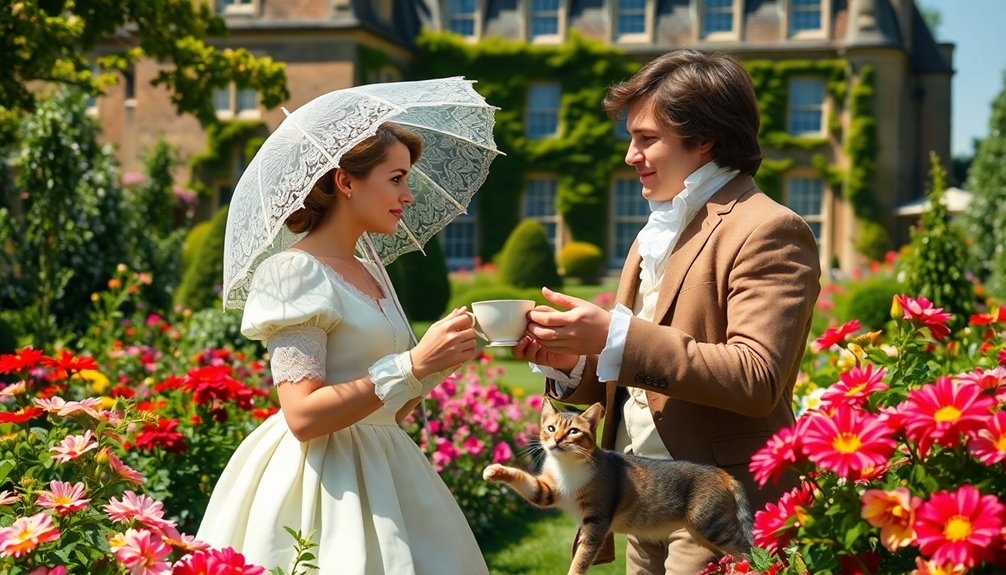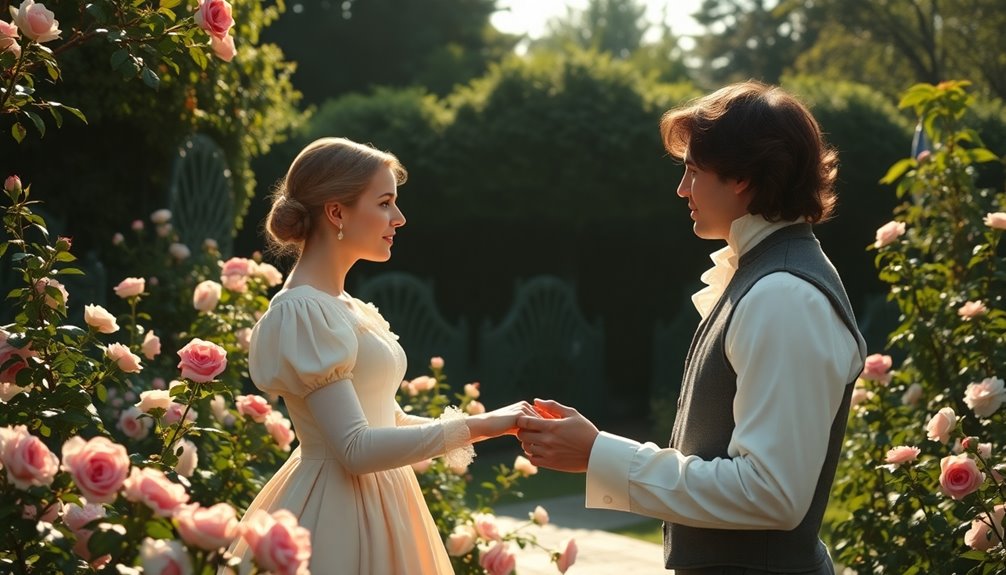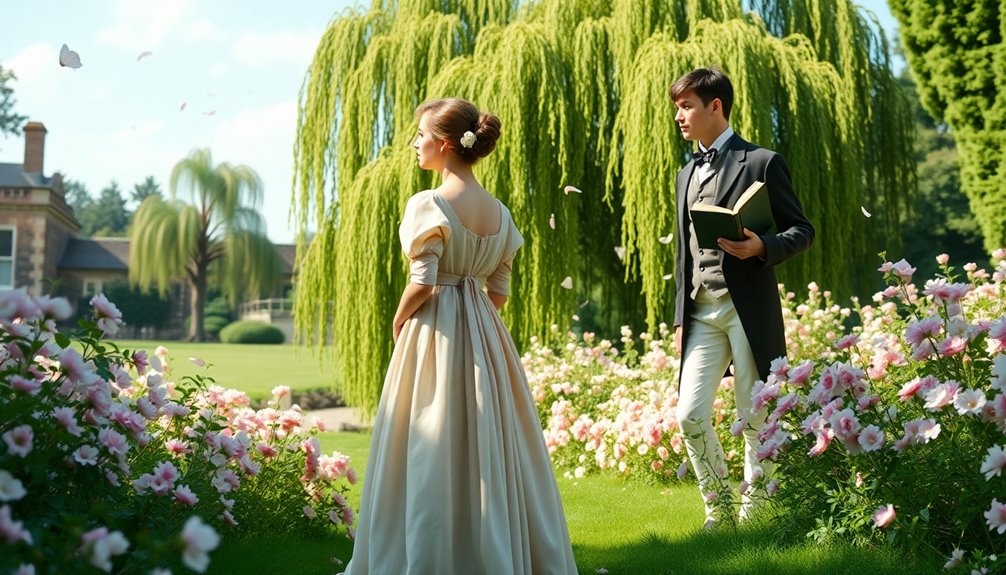Revisiting the romance in "Pride and Prejudice," you see how love intertwines with societal expectations and personal growth. Elizabeth Bennet navigates her feelings amidst class pressures, challenging norms with her assertiveness. The gradual development of her relationship with Mr. Darcy, marked by misunderstandings and revelations, showcases deep emotional connections. Through wit and satire, Austen critiques marriage as an economic strategy rather than a romantic ideal. As characters confront their biases, personal agency emerges as a crucial theme in finding true love. Discovering how these elements intertwine opens up a richer understanding of Jane Austen's timeless tale.
Austen's Enduring Appeal

Although Jane Austen's "Pride and Prejudice" was published over 200 years ago, its themes of love and societal expectations still resonate with readers today.
What makes Austen's work so appealing is her ability to craft relatable characters, like Elizabeth Bennet, who navigate the complexities of romance novels in a society focused on social standing and economic necessity. Her characters exemplify the resilience and determination often seen in strong female protagonists who challenge societal norms and expectations. Additionally, Austen's vivid character development mirrors the masterful portrayal of the human spirit's resilience found in Dickens' works, enriching the narrative with profound emotional depth.
You find that her sharp wit and humor create a compelling narrative that critiques romantic ideals while highlighting the importance of personal growth and flawed decisions.
This contrast between Elizabeth and modern romantic heroes invites you to reflect on what long-term love truly means.
Austen's exploration of gender roles and social norms continues to spark discussions, ensuring her enduring appeal across generations. Moreover, her portrayal of the impact of social class on relationships resonates with contemporary audiences facing similar issues.
The Complexity of Romance
As you explore the complexity of romance in "Pride and Prejudice," you'll notice that relationships unfold slowly, shaped by misunderstandings and personal growth. This gradual development contrasts with the instant attraction found in modern narratives.
- Elizabeth's sharp wit clashing with Darcy's reserved nature
- Moments of tension that reveal hidden feelings
- The painful realization of mistaken judgments
- Sweet, tender exchanges that build emotional connections
Through these elements, Austen emphasizes that true romance requires understanding and compatibility rather than mere attraction. The journey through memory and self-reflection in relationships echoes the complexity of navigating love. Notably, the intricate plots woven by authors during the Victorian era often mirror this journey, showcasing how romantic sagas can engage readers in profound emotional exploration.
Elizabeth's journey from prejudice to appreciation highlights significant character growth, showing that maneuvering through misunderstandings can deepen connections. In a similar vein, characters in literature often demonstrate resilience amidst adversity, illustrating how personal challenges can enrich emotional bonds.
The contrasting paths of various couples further illustrate that each romantic journey, with its challenges, enriches the story's depth and significance.
Societal Expectations and Love

In "Pride and Prejudice," you see how economic pressures shape the landscape of love and marriage in Regency-Era England.
Characters like Mrs. Bennet push for advantageous matches, while Elizabeth Bennet challenges these norms by prioritizing genuine connection over financial security. The complexities of marital dynamics further illuminate the nuances of character motivations and societal expectations. This tension reveals the struggle between societal expectations and true emotional fulfillment in relationships, much like the love triangle seen in "Gone With the Wind." The narrative also echoes themes of class and social mobility, highlighting how wealth impacts identity and relationships.
Economic Pressures on Marriage
Marriage in Regency-Era England often served as a strategic move for financial security rather than a purely romantic endeavor. You see, women had few career options and relied on advantageous unions for economic stability, which shaped societal expectations.
- Mrs. Bennet's relentless matchmaking efforts
- The Dashwood family's precarious financial situation
- Elizabeth's brave rejection of Mr. Collins
- Jane's immediate attraction to Mr. Bingley
These elements highlight how marriage prospects were closely tied to social status and financial considerations.
While love was a factor, it often took a backseat to economic necessity.
Elizabeth Bennet's choice to prioritize her happiness over societal norms stood out, illustrating the complex dance between love and economic pressures in Austen's world.
Social Norms and Relationships
The pressures of economic necessity didn't just shape marriage prospects; they also influenced societal norms surrounding love and relationships. In Regency-Era England, societal expectations forced women to prioritize financial security over genuine affection in romantic relationships.
Mrs. Bennet's relentless pursuit of advantageous marriages for her daughters highlights this harsh reality. Elizabeth Bennet's rejection of Mr. Collins, contrasted with her eventual acceptance of Mr. Darcy, reveals the tension between societal expectations and personal desire.
Misjudgments, like Elizabeth's initial views of Mr. Darcy and Mr. Wickham, underscore how societal norms can cloud perceptions of love. Ultimately, Austen critiques the notion of romantic love, suggesting that true connections often blossom through personal growth and understanding, rather than mere conformity to societal expectations.
Character Development in Relationships
While maneuvering through the complexities of romance in "Pride and Prejudice," you'll notice that character development plays a pivotal role in shaping the relationships.
Elizabeth Bennet and Mr. Darcy's journey showcases how personal growth transforms their misunderstandings into profound connections.
- Elizabeth's initial prejudice crumbles as she recognizes Darcy's virtues.
- Darcy sheds his pride, learning humility through love.
- Misjudgments reveal the necessity for self-reflection in nurturing romance. In parallel, Coates discusses the importance of self-discovery in confronting societal issues. The evolution of their characters emphasizes the value of mindful communication in fostering deeper connections.
- The contrasting dynamics of Jane and Mr. Bingley illustrate societal pressures on growth.
Through their evolving interactions, both characters confront their flaws, emphasizing that true character development is essential for a successful relationship.
Their evolution ultimately leads to a deeper understanding of love, making their union all the more rewarding. This transformative journey mirrors the themes of forgiveness and redemption found in other classic narratives, highlighting the universal importance of personal growth.
Humor as a Narrative Tool

In "Pride and Prejudice," Austen's witty dialogue not only entertains but also deepens your understanding of character dynamics.
As you navigate the comedic misunderstandings and sharp exchanges, you start to see how humor cleverly critiques societal norms of the time. This interplay of wit and romance reveals much about relationships and the characters' true natures. Additionally, the power and resilience of female characters in literature often highlight their journeys through comedy and romance, much like Austen's heroines. Furthermore, the exploration of generational poverty in other literary works, such as "A Tree Grows in Brooklyn," showcases how humor can serve as a coping mechanism amidst struggles. The themes of redemption and second chances often found in Christian romance novels mirror the complexities of love depicted in Austen's narrative.
Wit in Character Interactions
How does humor shape the interactions between characters in "Pride and Prejudice"? Jane Austen masterfully employs wit to create humorous exchanges that not only entertain but also deepen character development.
Elizabeth Bennet's sharp observations reveal societal norms and flawed perceptions, particularly in her interactions with Mr. Darcy and Mr. Wickham.
- The comically awkward proposal from Mr. Collins
- Lively banter igniting romantic tension between Elizabeth and Mr. Darcy
- Unexpected misunderstandings that challenge perceptions
- Memorable quotes that linger in your mind
These humorous moments highlight the absurdity of social expectations and enhance the complexity of relationships, making Austen's narrative rich with insight into the intricacies of Regency England's social interactions.
Satire of Social Norms
Through its sharp wit, "Pride and Prejudice" cleverly critiques the absurd social norms surrounding marriage and courtship in Regency-Era England.
Austen employs humor and satire to expose the ridiculousness of these expectations. Mr. Collins epitomizes social climbing with his pompous proposal to Elizabeth, while Mrs. Bennet's frantic obsession with marrying off her daughters highlights the comical lengths women must go to secure advantageous matches.
The witty exchanges between Elizabeth and Mr. Darcy reveal the irony of misunderstandings rooted in societal conventions. Additionally, characters like Lady Catherine de Bourgh showcase the absurdity of aristocratic privilege, allowing you to laugh at the rigid class structures.
Through humor, Austen deftly invites you to question and reflect on these outdated social norms.
Lessons on Love and Growth
While steering through the complexities of relationships, you'll find that "Pride and Prejudice" offers valuable lessons on love and personal growth.
Elizabeth Bennet's journey teaches you that self-awareness is vital for developing meaningful connections. As you navigate your own romantic pursuits, consider these insights:
- Growth often emerges from overcoming misunderstandings.
- Genuine love requires understanding and compatibility, not just attraction.
- Patience and forgiveness are essential in nurturing relationships.
- Individual timelines shape the unique paths of love.
The Role of Family Dynamics

In "Pride and Prejudice," family dynamics shape the characters' views on marriage and personal growth.
You see how Mrs. Bennet's relentless push for advantageous matches contrasts with Mr. Bennet's indifference, revealing the tension between expectations and individual desires.
The financial pressures on the Bennet family further complicate their relationships, illustrating how economic circumstances influence romantic choices.
Influence of Marriage Expectations
Amidst the intricate dance of social expectations, marriage in "Pride and Prejudice" becomes an essential lens through which family dynamics unfold.
You see the Bennet family's struggles, where societal expectations dictate that daughters marry for financial security. Mrs. Bennet epitomizes this pressure, relentlessly seeking wealthy suitors for her girls.
- The ticking clock of age and status
- The weight of family reputation
- The shimmering allure of wealth
- The poignant tension between love and duty
Elizabeth's defiance of Mr. Collins highlights her individual desires clashing with these obligations.
In contrast, Jane and Bingley's straightforward romance showcases a different response to marriage expectations, reflecting the diverse paths shaped by family dynamics and societal norms.
Character Flaws and Growth
Marriage expectations shape the characters in "Pride and Prejudice," revealing their flaws and prompting personal growth. The Bennet family's dynamics greatly influence their views on relationships.
Elizabeth's independence stems from her mother's obsessive pursuit of marriage and her father's indifference, pushing her to seek meaningful connections. In contrast, Lydia and Kitty's frivolity highlights the dangers of unchecked family influence, jeopardizing the family's reputation.
Mr. Darcy's evolution showcases how Elizabeth's strong moral compass molds his character, emphasizing the impact of familial expectations on personal choices.
Each character's journey reflects their flaws and growth, illustrating how family dynamics shape their understanding of love and societal norms, ultimately leading them toward self-awareness and deeper connections.
Financial Security and Relationships
While the allure of romance often takes center stage in "Pride and Prejudice," the reality of financial security looms large over the characters' relationships. You see how family dynamics shape decisions, revealing the weight of societal pressures.
- Mrs. Bennet's frantic schemes for wealthy husbands
- Elizabeth's bold rejection of Mr. Collins
- Darcy's struggle against class expectations
- The Dashwoods' financial plight, highlighting vulnerability
These elements underscore the tension between love and economic stability.
Elizabeth's refusal to marry for security illustrates her desire for genuine connection, contrasting sharply with her family's obsession with advantageous unions.
Ultimately, the interplay of financial security and relationships shapes their romantic pursuits, reminding you that love and money often collide in complex ways.
Misunderstandings and Misjudgments
Understanding the intricate dance of misunderstandings and misjudgments in *Pride and Prejudice* reveals how deeply personal biases can shape relationships.
Elizabeth Bennet's initial prejudice against Mr. Darcy stems from his aloof demeanor and perceived arrogance, clouding her judgment. Darcy's first proposal highlights his misjudgment; he assumes his social status guarantees her affection, overlooking her disdain for his condescension.
Meanwhile, Elizabeth's attraction to Mr. Wickham leads her to misjudge Darcy's character, complicating her feelings further. These misunderstandings reflect the societal expectations and limited communication of their Regency-era context.
Ultimately, both Elizabeth and Darcy confront their biases, paving the way for personal growth and a deeper understanding of each other, emphasizing how misjudgments can hinder authentic relationships.
Selflessness in Romantic Gestures

Selflessness in romantic gestures often reveals the true depth of love, as seen in *Pride and Prejudice*. Mr. Darcy's intervention for Lydia Bennet illustrates how love manifests through action, while Elizabeth's care for her ill sister Jane highlights her devotion.
These moments show that genuine affection thrives on unselfishness rather than grand displays.
- Mr. Darcy risking his reputation for Elizabeth's family
- Elizabeth prioritizing Jane's health over her own desires
- Quiet acts of kindness that strengthen relationships
- Love that grows from putting others first
Austen critiques societal norms by showcasing characters whose selfless love leads to personal growth.
Ultimately, these actions illuminate that true romance lies in the willingness to prioritize the happiness of others.
Challenging First Impressions
Although first impressions often shape our perceptions, they can be misleading, as demonstrated in *Pride and Prejudice*.
Elizabeth Bennet's initial attraction to Mr. Wickham highlights this deception; she later discovers his true character, revealing the danger of misinterpretation. Conversely, Mr. Darcy's aloofness leads her to view him as proud and arrogant, showcasing how surface appearances can cloud judgment.
The title itself, "Pride and Prejudice," underscores the flaws in characters' first impressions, emphasizing how these biases hinder genuine understanding. As Elizabeth's perception of Darcy evolves, you see that deeper knowledge is essential for authentic connections.
Austen critiques the romantic ideal of love at first sight, advocating instead for a more nuanced approach to love that values insight over initial attraction.
Timelines of Love

As you explore the timelines of love in *Pride and Prejudice*, you'll notice that different couples experience romance at their own pace.
– Jane and Bingley's instant attraction sparkles like a summer
Critique of Marriage Norms
In "Pride and Prejudice," Austen challenges the idea of marriage as merely an economic strategy shaped by social pressures.
You see how characters like Elizabeth Bennet reject arranged matches in favor of love, exposing the flaws in societal expectations.
This critique invites you to reconsider the true essence of relationships beyond financial gain and social status.
Marriage as Economic Strategy
Marriage in Regency-Era England often served as a financial strategy rather than a romantic endeavor, reflecting the harsh realities women faced in a society with limited economic opportunities.
You can see this through the societal pressures that compelled women to seek financial security through marriage.
- Mrs. Bennet's frantic matchmaking for her daughters
- Elizabeth's bold refusal of Mr. Collins
- Jane's swift attraction to Bingley
- Darcy and Elizabeth's complex emotional journey
Austen critiques this transactional view of marriage, highlighting the importance of personal choice.
While some characters navigate societal norms for financial gain, others, like Elizabeth, prioritize emotional connections, revealing a deeper longing for love over mere economic arrangements.
Social Pressure to Marry
While societal expectations loom large over individuals in Regency-Era England, the pressure to marry often overshadows genuine affection. For women, marriage isn't just a romantic endeavor; it's a crucial means of financial security.
You see this vividly through Mrs. Bennet's relentless pursuit to secure advantageous matches for her daughters. The Bennet family's precarious financial situation highlights how societal pressures dictate marriage choices, with wealthy suitors like Mr. Bingley and Mr. Darcy viewed as essential for survival.
Elizabeth Bennet's rejection of Mr. Collins exemplifies her defiance against these societal norms, revealing the tension between personal desires and external expectations.
The novel critiques the consequences of marrying for economic reasons, emphasizing that true love must triumph over societal pressures in the quest for happiness.
Arranged vs. Romantic Love
Although societal norms often dictate the terms of love and partnership, Jane Austen's "Pride and Prejudice" poignantly critiques the tension between arranged marriages and romantic love. You see this clash through Elizabeth Bennet's rejection of Mr. Collins and her deepening bond with Mr. Darcy, challenging societal expectations.
- The cold comfort of financial security
- The vibrant spark of genuine connection
- The weight of social status
- The liberation of mutual respect
Characters like Charlotte Lucas represent the pragmatism of arranged marriages, while Darcy's transformation illustrates the journey toward emotional compatibility.
Austen advocates for love rooted in respect and desire, suggesting that true happiness lies beyond the confines of tradition and economic necessity.
The Significance of Personal Agency

Personal agency plays an essential role in "Pride and Prejudice," particularly through the character of Elizabeth Bennet, who actively shapes her romantic path. Rather than succumbing to societal pressures, she boldly rejects Mr. Collins' proposal, prioritizing love over financial security. This choice highlights her commitment to personal agency and her desire for genuine connection.
Elizabeth's assertiveness with Mr. Darcy challenges traditional gender roles, insisting on equality in their relationship. Their evolving dynamic showcases the importance of self-awareness, as both characters confront their prejudices and grow together.
Austen critiques societal norms by illustrating how Elizabeth and Darcy navigate their own personal agency, ultimately transforming into more altruistic individuals, paving the way for a love based on mutual respect and understanding.
Lasting Impact of the Novel
The enduring legacy of "Pride and Prejudice" is evident in its profound influence on literature and culture over the past two centuries. This novel's exploration of romance and societal norms continues to resonate, inspiring countless adaptations and discussions.
You can see its impact in:
- Witty dialogue that sparks laughter and reflection
- Complex characters traversing love and societal expectations
- Evolving relationships that showcase rich character development
- Timeless themes that provoke thought on gender roles
Jane Austen's sharp satire and insightful commentary foster a lasting appreciation for her narrative style.
The novel not only entertains but also encourages readers to examine their own relationships and societal pressures, ensuring its relevance in modern conversations about love and identity.
Conclusion
As you close the pages of *Pride and Prejudice*, you can't help but feel the pulse of romance that Austen masterfully weaves through her characters' lives. In a world where societal expectations often overshadow true love, you discover the beauty of personal agency and growth. Each relationship blooms like a wildflower, reminding you that love thrives in authenticity. Austen's timeless tale continues to resonate, urging you to embrace the complexities of your own romantic journey.



